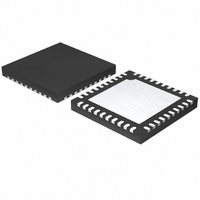ISL6261AIRZ-T Intersil, ISL6261AIRZ-T Datasheet - Page 19

ISL6261AIRZ-T
Manufacturer Part Number
ISL6261AIRZ-T
Description
IC CORE CTRLR 1PHASE 40-QFN
Manufacturer
Intersil
Datasheet
1.ISL6261ACRZ.pdf
(33 pages)
Specifications of ISL6261AIRZ-T
Applications
Converter, Intel IMVP-6
Voltage - Input
5 ~ 21 V
Number Of Outputs
1
Voltage - Output
0.3 ~ 1.5 V
Operating Temperature
-40°C ~ 100°C
Mounting Type
Surface Mount
Package / Case
40-VFQFN, 40-VFQFPN
Lead Free Status / RoHS Status
Lead free / RoHS Compliant
Static Mode of Operation - Static Droop Using DCR
Sensing
The ISL6261A has an internal differential amplifier to
accurately regulate the voltage at the processor die.
For DCR sensing, the process to compensate the DCR
resistance variation takes several iterative steps. Figure 2
shows the DCR sensing method. Figure 9 shows the
simplified model of the droop circuitry. The inductor DC
current generates a DC voltage drop on the inductor DCR.
Equation 15 gives this relationship.
An R-C network senses the voltage across the inductor to
get the inductor current information. R
network consisting of R
will be discussed in the next section.
The first step in droop load line compensation is to choose
R
at light loads between the VSUM and VO nodes. As a rule of
thumb, the voltage drop across the R
be 0.5 to 0.8 times V
a fairly reasonable amount of light load signal from which to
derive the droop voltage.
The NTC network resistor value is dependent on the
temperature and is given by Equation 16:
V
R
n
DCR
n
and R
(
T
=
)
Internal to ISL6261A
=
OC
I
s
o
(
such that the correct droop voltage appears even
R
×
R
series
series
DCR
+
+
R
DCR
R
ntc
ntc
ntc
1
. This gain, defined as G1, provides
)
+
, R
⋅
R
R
FIGURE 9. EQUIVALENT MODEL FOR DROOP CIRCUIT USING DCR SENSING
series
19
par
par
and R
10µA
n
n
DROOP
network, V
represents the NTC
par
. The choice of R
DROOP
OCSET
VSUM
n
DFB
, is set to
VO
(EQ. 15)
(EQ. 16)
ISL6261A
s
R ocset
G1, the gain of V
temperature of the NTC thermistor:
The inductor DCR is a function of the temperature and is
approximately given by Equation 18:
in which 0.00393 is the temperature coefficient of the copper.
The droop amplifier output voltage divided by the total load
current is given by Equation 19:
R
independent of the inductor temperature, it is desired to
have:
where G
temperature characteristics G
For different G1 and NTC thermistor preference, Intersil
provides a design spreadsheet to generate the proper value
of R
R
droop amplifier gain, according to Equation 22:
G
G
G
k
DCR
R
droop
drp1
droopamp
1
1
droop
1
(
(
(
T
ntc
T
) T
(
)
(R
)
, R
T
is the actual load line slope. To make R
VO
⋅
=
=
=
Δ
1 (
11
1target
)
series
=
G
1 (
R
=
+
in Fig. 2) and R
1
n
1
R par
+
DCR
. 0
(T)
R
+
(
. 0
T
, R
00393
is the desired ratio of V
n
R
R
(
00393
)
⋅
n
T
par
G
drp
drp
+
DCR
25
to V
)
t 1
.
C
2
R
1
arg
⋅
( *
s
DCR
1 (
*
et
(
T
R series
R ntc
T (
T
+
drp2
, is also dependent on the
−
)
. 0
−
⋅
25
00393
25
k
1
(R
droopamp
))
is described by Equation 21:
Rn
)
12
≅
in Figure 2) sets the
G
( *
(R ntc +R series )
n
R
1
ntc
t
/V
T
arg
R s
DCR
V dcr
−
+R series
et
25
. Therefore, the
))
droop
December 21, 2007
I
o
+R par
R par
DCR
(EQ. 17)
(EQ. 18)
(EQ. 19)
(EQ. 20)
(EQ. 21)
(EQ. 22)
FN6354.2












